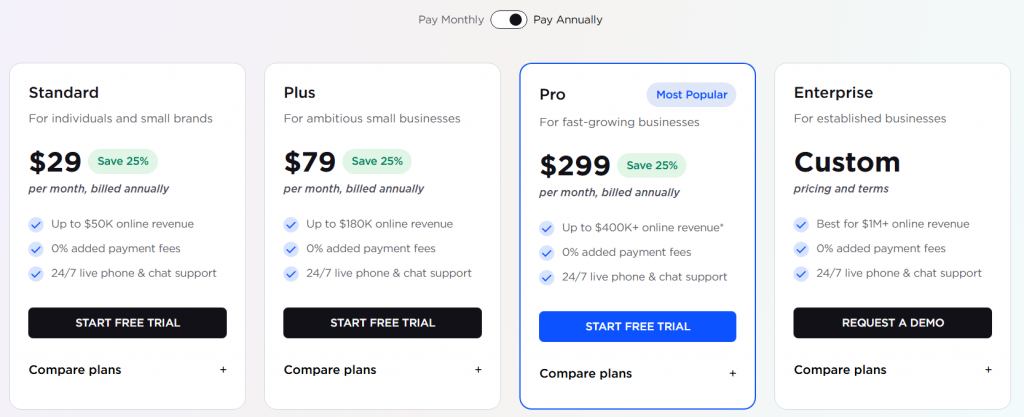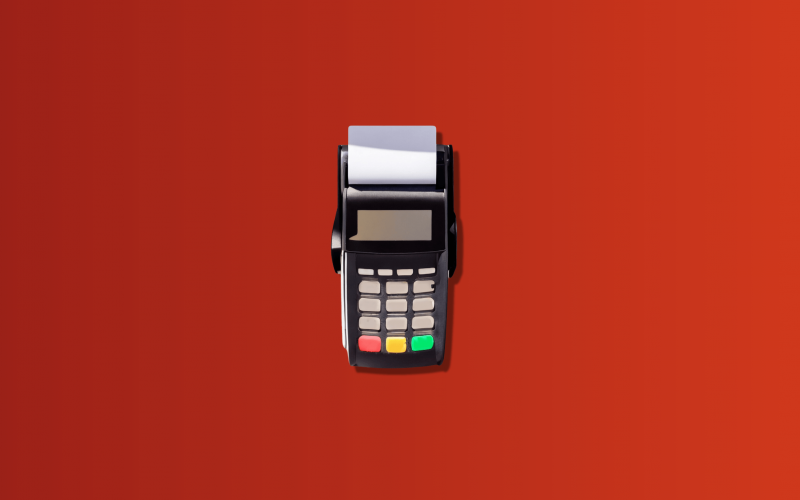Key takeaways:
- BigCommerce is a multipurpose ecommerce platform suitable for businesses of all sizes, from small startups to large enterprises, including both B2B and B2C models.
- Integration with accounting software and payment gateways through apps like Synder simplifies financial management for BigCommerce users.
- In collaboration with Google Cloud, AI integration enhances operational efficiencies and customer experiences.
- Comparison with competitors shows BigCommerce as a strong competitor due to its scalability, no transaction fees, and broad payment options.
Contents:
2. Origins and evolution of BigCommerce
3. Target audience and ideal BigCommerce users
7. Pros and cons of BigCommerce
8. How can Synder help you with BigCommerce?
9. How is BigCommerce integrating AI for ecommerce?
10. BigCommerce vs. competitors
11. What is BigCommerce? Final thoughts
What is BigCommerce?
BigCommerce is a leading cloud-based ecommerce platform designed to support businesses in creating, managing, and scaling their online stores. It offers a robust suite of tools to facilitate the selling of products and services online, catering to a wide range of industries.
Origins & evolution of BigCommerce
BigCommerce’s journey began in 2009 when Eddie Machaalani and Mitchell Harper founded it. What began with just two people has grown into a worldwide company that helps thousands of businesses.
This amazing change from a small startup to a global name in the ecommerce world shows not just growth but also smart planning, strategic partnership, and new ideas.
Here are some interesting highlights and achievements that underline BigCommerce’s evolution.
1. Fast growth
BigCommerce has grown quickly every year, becoming more and more popular with online stores. Since it started, it has reached customers in over 150 countries.
2. Going public
A big moment for BigCommerce was in August 2020 when it started selling shares on the NASDAQ stock exchange with the symbol “BIGC.” This showed that the company was doing well financially and had plans to grow even more.
3. Partnerships with big names
Over time, BigCommerce teamed up with big companies like Google, Facebook, and Amazon. This means store owners can use these companies’ tools for marketing, selling, and understanding their data, all through BigCommerce.
4. Awards & recognition
BigCommerce has won several awards, including being called a “Leader” in ecommerce by Gartner, a group that looks at how well companies do what they promise.
5. Supportive community
More than just tech, BigCommerce has a strong community of people who make apps, design, and know a lot about selling online. They offer a lot of help and tools, including forums and more than 600 apps, to make online stores better.
These highlights show how committed BigCommerce is to helping businesses of every size do well online. With ongoing updates and smart moves, BigCommerce keeps leading the way in ecommerce, ready for whatever comes next.
Target audience and ideal BigCommerce users
BigCommerce caters to a wide range of businesses, from SMEs (Small and medium-sized enterprises) and startups to large enterprises and B2B (Business-to-business) companies. It offers a scalable and user-friendly platform ideal for those without technical expertise. Here’s how BigCommerce serves different segments of its target audience:
For Small business owners & startups:
- Drag-and-Drop page builder: Simplifies store customization without coding, ideal for unique storefronts.
- Built-in SEO tools: Enhances online visibility through customizable URLs and meta tags.
For Mid-sized businesses:
- Multi-currency support: Facilitates global sales with automatic currency conversion.
- Customer segmentation: Enables targeted campaigns and pricing for different customer groups.
For Large enterprises:
- API access: Allows seamless integration with existing business systems for efficient operations.
- Advanced security: Protects online stores with HTTPS, SSL support, and fraud detection.
Similar reads: What Does API Mean in Accounting?
For B2B companies:
- Custom pricing options: Supports wholesale and negotiated pricing for different customer groups.
- Bulk order forms: Simplifies large orders, making bulk purchases easier.
BigCommerce’s diverse features make it a flexible solution for businesses at any growth stage, ensuring they have the necessary tools for online retail success.
How does BigCommerce work?
BigCommerce functions as a SaaS (Software as a Service) platform, where subscriptions replace the need to purchase software outright. This approach offers a cost-effective, low-maintenance solution for businesses to establish and manage their ecommerce presence, including hosting, security, and various customizable templates for storefront design.
BigCommerce features
BigCommerce is a powerful ecommerce platform that provides a comprehensive set of features designed to help businesses build, run, and grow their online stores efficiently. Here’s an overview of some of the key features offered by BigCommerce.
1. Customizable templates
BigCommerce offers a variety of customizable templates and themes that can be used to create a professional-looking online store without needing extensive coding knowledge. These templates are responsive, ensuring your site looks great on any device.
2. Product variants & options
BigCommerce supports the creation of product variants and options, such as size, color, and material, without impacting the overall ease of inventory management. Each variant can have its own SKU, price, weight, and stock level.
3. Inventory tracking
BigCommerce allows for real-time inventory tracking, enabling you to monitor stock levels closely. You can set up alerts to notify you when inventory is low, helping to prevent stockouts.
Dive into efficient stock control with our detailed exploration: “Inventory Management: QuickBooks Online and Desktop Inventory Tracking Solutions.”
4. Bulk management
Through the platform, businesses can manage inventory in bulk, making it simpler to update product details, adjust pricing, and change stock levels across multiple products simultaneously. This is especially useful for large catalogs or seasonal updates.
5. Automated restocking
The platform offers features that help automate the restocking process. For instance, you can set up automatic reorder points, ensuring that orders for new stock are triggered when inventory reaches a certain level.
6. Multi-channel inventory sync
If you’re selling across multiple channels (e.g., your online store, marketplaces like Amazon, social media platforms), BigCommerce can synchronize inventory across all these channels. This ensures accurate stock levels are maintained everywhere you sell, reducing the risk of overselling.
7. SEO & marketing tools
The platform includes built-in SEO tools that help improve your store’s visibility in search engine results. Additionally, it offers marketing features like coupons, discounts, gift cards, email marketing integrations, and more to help you attract and retain customers.
8. Sales channels
BigCommerce allows you to sell not just through your website, but also across multiple channels, including social media platforms (Facebook, Instagram, etc.), marketplaces (Amazon, eBay, etc.), and through Google Shopping.
9. Payment & shipping
It supports a wide range of payment gateways without charging extra transaction fees. The platform also offers various shipping options and integrates with major carriers to provide real-time shipping quotes.
10. Analytics & reporting
BigCommerce provides detailed analytics and reporting tools that give insights into sales trends, customer behavior, and website performance, helping you make informed business decisions.
11. App marketplace
Access to an extensive app marketplace where you can find additional tools and services to extend the functionality of your online store, covering areas such as marketing, shipping, inventory management, and customer service.
12. Security & compliance
BigCommerce ensures a high level of security for online stores by offering features like SSL certification, DDOS protection, and compliance with PCI DSS standards to safely process and store credit card information.
13. 24/7 customer support
The platform provides around-the-clock support through various channels, including phone, email, and live chat, along with a comprehensive knowledge base for self-help.
BigCommerce: Pricing
BigCommerce offers various pricing plans to cater to businesses of different sizes and needs. The pricing structure is designed to scale with your business, providing more advanced features and lower transaction fees as you move to higher-tier plans. Here’s an overview of the main pricing tiers offered by BigCommerce.

This is the entry-level plan, suitable for new and small businesses just starting out. It typically includes all the basic features needed to launch and manage an online store, such as unlimited products, no transaction fees, responsive website templates, and access to various sales channels. The Standard Plan also includes professional reporting tools and various payment gateway integrations.
2. Plus plan
Aimed at growing businesses looking for additional marketing and conversion optimization tools, the Plus Plan includes everything in the Standard Plan, plus features like customer segmentation, abandoned cart saver, and stored credit cards. This plan is designed to help increase conversion rates and customer loyalty.
3. Pro plan
Designed for larger businesses requiring more advanced features, the Pro plan includes everything in the Plus plan, along with higher API call limits, advanced product filtering, and Google customer reviews integration. This tier also offers improved shipping discounts and is geared towards businesses needing greater scalability and performance.
4. Enterprise plan
Tailored for high-volume and complex businesses, the Enterprise plan offers custom pricing and includes all the features of the Pro Plan, plus additional premium services and support. This includes priority support, advanced data analysis tools, and a dedicated account manager. The Enterprise Plan is best suited for businesses with very high traffic and sales volumes that require custom solutions.
Pricing for each plan is typically based on a monthly subscription model, with discounts available for annual commitments. The specific costs can vary based on promotional offers, regional pricing, and changes over time, so it’s important to check BigCommerce’s official website or contact their sales team for the most current pricing information.
Pros and cons of BigCommerce
BigCommerce stands out in the ecommerce platform market for its comprehensive feature set, scalability, and vast integration capabilities, catering to a wide range of business sizes and sectors. However, like any platform, it comes with its set of pros and challenges. Here’s a breakdown of the pros and cons.
BigCommerce pros
1. Customization & integration
BigCommerce provides a robust platform for customization and integration with various apps and services, enhancing website functionality and user experience. Users have successfully integrated shipping, email marketing apps, POS data, and more, facilitating efficient operations and data analysis.
2. Open APIs
The platform offers open APIs, allowing for easy customizations and integrations with other platforms and services. This flexibility supports specific website needs and operational efficiencies, particularly noted as being easier compared to some competitors.
Related reading: How To Integrate Third-Party APIs Into Your Store
3. No transaction fees
BigCommerce sets itself apart from many other ecommerce platforms by not imposing transaction fees on its users. This policy can lead to significant cost savings for businesses, especially those with high sales volumes, making BigCommerce an economically attractive option for online retailers.
4. Wide array of payment options
BigCommerce offers an extensive array of payment gateways, with over 65 integrations available, catering to more than 100 countries and supporting over 250 local payment methods. This diversity includes major gateways like PayPal, Stripe, and Square, offering businesses unparalleled flexibility in payment processing. Such inclusivity allows merchants to meet the varied preferences of a global customer base, potentially enhancing the shopping experience and increasing sales conversions by ensuring that customers can use their preferred payment methods.
5. Scalability
The platform is designed to grow with your business, offering plans from Standard to Enterprise with increasing features and capabilities. This includes the ability to sell unlimited products, access to various sales channels, and advanced features for larger businesses.
BigCommerce cons
When considering BigCommerce for your e-commerce platform, it’s essential to weigh its disadvantages alongside its benefits. Here are some commonly noted cons of BigCommerce.
1. Pricing structure
BigCommerce offers several pricing tiers, which can be higher than some competitors, especially for small businesses just starting out. As your sales grow, you may be automatically upgraded to a more expensive plan.
2. Learning curve
While BigCommerce is designed to be user-friendly, newcomers to e-commerce might find its wide array of features overwhelming. There’s a learning curve to navigate the platform effectively.
3. Sales thresholds
Each pricing tier has sales thresholds. If your store exceeds these thresholds over a 12-month period, you’ll be required to upgrade to a more expensive plan, which can increase operational costs unexpectedly.
4. Third-party apps & integration costs
While BigCommerce offers a robust set of built-in features, you may find yourself needing third-party apps for specific functionalities. These apps can add to the monthly costs of running your store.
5. International sales
If you’re aiming to sell globally, you might encounter limitations with currency and payment methods, although BigCommerce is making strides in improving its international e-commerce capabilities.
Considering these cons is crucial in determining whether BigCommerce aligns with your business needs and long-term goals. It’s also beneficial to compare these aspects with other e-commerce platforms to make an informed decision.
How can Synder help you with BigCommerce?
Synder app significantly streamlines the accounting process for BigCommerce store owners, offering a seamless integration that automates exhausting, time-consuming bookkeeping tasks. Here’s how Synder facilitates this integration, enhancing efficiency and accuracy in financial management.
1. No more manual entry
Synder automatically syncs sales, fees, refunds, and payouts from BigCommerce and any connected payment platforms (like Stripe) into your accounting software. This automation reduces manual data entry and the likelihood of errors.
2. Comprehensive data sync
The app ensures that every transaction detail, including customer information, items sold, taxes, shipping costs, and discounts, is accurately reflected in your accounting system. This comprehensive approach ensures that your financial records are detailed and complete.
3. Easy to get started
Synder simplifies the integration process with BigCommerce. Users can start by creating a free trial account, selecting Synder products (‘Synder Sync’ or ‘Business Insights’), and providing business details. Connecting your BigCommerce store to Synder is straightforward, requiring only admin access to link the platforms.
4. Connects to payment gateways too
If your BigCommerce store uses supported payment gateways, connecting these to Synder as well will yield automatic, detailed records of all financial transactions, including additional information from BigCommerce orders. This setup prevents data duplication and ensures a smooth workflow.
For key insights on selecting the ideal payment solution, check out: “An Essential Guide to Payment Gateways: Choosing the Best Payment Gateway for Your Business.”
5. Financial insights & reporting
Beyond just syncing transactions, Synder offers Business Insights, a feature that aggregates data across sales channels and payment gateways. It provides hourly updated insights into product performance, customer behavior, and key financial health indicators such as total sales and average order value.
Learn how to make smart business decisions using your data with our easy guide: “How to Get Business Insights from Data: Data Insights with Synder.” This article shows you simple ways to understand your data better and use Synder to help your business grow.
6. Advanced features for data security
Synder incorporates features like duplicate detection and rollback options, giving store owners peace of mind by securing their accounting against errors and ensuring that any mistakes can be easily corrected.
7. Customization & configuration
After connecting BigCommerce to Synder, users can fine-tune settings to match their specific needs, including adjusting tax, item, or customer configurations. The Smart Rules feature also helps fill in any gaps in data post-sync, such as applying classes or locations to transactions.
Synder turns accounting from a routine into something straightforward and stress-free for BigCommerce store owners. Plus, if you ever need help or want to adjust something, Synder’s support is just a message or call away.
How is BigCommerce integrating AI for ecommerce?
BigCommerce is using AI in collaboration with Google Cloud to introduce a suite of new features aimed at improving merchant ecommerce operations. This partnership focuses on enhancing various aspects of online retail, from operational efficiencies to customer experiences, through AI-powered tools and analytics. Key areas where AI is being integrated include:
1. Product descriptions
Utilizing AI to generate compelling product descriptions, helping merchants save time and improve their product catalogs’ marketability. This feature is expected to enhance SEO, product discovery, and conversion rates by making catalogs more accessible and engaging.
2. Personalized storefronts
Using AI for creating personalized product recommendations tailored to each customer’s preferences. This aims to elevate product discovery, potentially increasing average order values (AOV), conversion rates, and customer lifetime value (LTV).
3. Data analytics
AI-driven analytics will offer merchants deeper insights into store performance and customer trends. The Ecommerce Insights tool by BigCommerce is set to evolve with new AI capabilities, enabling merchants to make informed decisions based on comprehensive data analysis.
BigCommerce is all about using AI the right way, making sure that all the information is safe and that shop owners have control over their data. They’re focusing on making technology work well for everyone, keeping shopper and store info secure.
In short, BigCommerce’s plan to use Google Cloud’s AI technology is all about making online stores smarter, more personal, and better informed. They’re aiming to help shop owners do well in today’s digital shopping world.
Optimize your business processes and explore Synder features with a free trial. To gain more insights and tips, book your seat on the informative Weekly Public Demo offered by Synder.
BigCommerce vs. competitors
When comparing BigCommerce to its competitors, it’s essential to look at several key factors that influence the choice of an e-commerce platform.
These factors include pricing, ease of use, customization capabilities, integration options, support services, and scalability.
BigCommerce is a leading ecommerce platform that offers a strong set of features designed for businesses of all sizes, but how does it stack up against its main competitors like Shopify, Magento (Adobe Commerce), and WooCommerce? Let’s break down the comparison in the table below:
| Feature | BigCommerce | Shopify | Magento (Adobe Commerce) | WooCommerce |
| Pricing | Varied plans starting from $29.95/month. Offers an enterprise solution for custom pricing. | Varied plans starting from $29/month. Plus, an enterprise solution for custom pricing. | Free open-source edition. Enterprise edition requires custom pricing. | Free plugin, but costs for hosting, themes, and extensions. |
| Ease of use | User-friendly with drag-and-drop editor. Some learning curve for advanced features. | Very user-friendly with an intuitive interface and drag-and-drop editor. | Requires more technical knowledge for setup and customization. | User-friendly, but requires handling of WordPress and potential technicalities of self-hosting. |
| Customiza-tion capabilities | Extensive through themes and HTML/CSS editing. Strong API for custom solutions. | Good customization with themes and basic code tweaks. Advanced customizations require higher-tier plans or developer skills. | Highly customizable with a strong developer community. Ideal for complex e-commerce sites. | Highly customizable through themes, plugins, and code modifications. |
| Integration options | Wide range of built-in integrations with third-party apps and services. | Extensive app store with numerous integrations for additional functionality. | A wide array of extensions is available for additional features and integrations. | Access to WordPress’s extensive plugin repository, offering vast integration possibilities. |
| Support | 24/7 support via phone, chat, and email. Community forum for additional help. | 24/7 support via phone, chat, and email. Plus, a vast range of documentation and community forums. | Community support for the open-source edition. Paid support for the enterprise edition. | Community support through forums. Paid support depends on service providers. |
| Scalability | Highly scalable with features supporting enterprise-level businesses. | Scalable to a point, but high-volume stores may need Shopify Plus for the best performance. | Excellent scalability, suited for large businesses with complex needs. | Scalable with the right hosting and setup but may require significant customization. |
| Accounting integrations | Integrates with major accounting software like QuickBooks, Xero, and more through apps and connectors. | Direct integrations with popular accounting tools like QuickBooks and Xero, along with third-party apps. | Integrations are available through extensions for software like Xero, QuickBooks Online and QuickBooks Desktop, and others. | Extensive integration capabilities with accounting software through plugins, including QuickBooks, Xero, and others. |
| Payment platforms | Support a wide range of payment gateways without additional transaction fees. Offers native support for digital wallets like Apple Pay and Google Pay. | Supports multiple payment gateways. Shopify Payments are available with additional credit card rates. Supports digital wallets. | Supports a broad spectrum of payment gateways. Extension-based integration may be required for some platforms. | Supports a wide array of payment options through WooCommerce Payments and additional plugins for various gateways and digital wallets. |
| Feature | BigCommerce | Shopify | Magento (Adobe Commerce) | WooCommerce |
For insights into choosing the right ecommerce platform, read our detailed comparison: “WooCommerce vs BigCommerce Compared: Exploring WooCommerce and BigCommerce vs Shopify”.
Section wrap-up
To summarize the comparison, BigCommerce stands out for its all-in-one approach, offering robust scalability and a wide range of built-in features that cater to businesses looking to grow without heavily relying on plugins or extensions.
Shopify is known for its ease of use and is particularly appealing to those new to e-commerce or looking for a simple setup with room to grow.
Magento (Adobe Commerce) offers unparalleled customization and scalability for large, complex e-commerce sites but requires significant technical expertise.
WooCommerce provides a flexible, cost-effective solution for those already familiar with WordPress, though it can become costly as additional features and scalability needs arise.
Choosing the right platform depends on your specific business needs, technical expertise, and growth aspirations. Each platform has its strengths and ideal use cases, making it crucial to evaluate them based on what matters most for your e-commerce venture.
To help you navigate the choice between leading ecommerce platforms, explore our analysis: “BigCommerce vs Shopify: Comparing Shopify vs BigCommerce for Your Business”.
What is BigCommerce? Final thoughts
BigCommerce really shines when it comes to growing your online store. It’s built to handle businesses of all sizes, making it super easy to expand without hitting roadblocks. What makes it stand out? Well, for starters, it doesn’t charge you extra for transactions, offers a lot of ways for your customers to pay, and works well with different apps and tools to make running your store smoother. Plus, it’s always getting better, with new features like AI that help keep your store at the cutting edge. For anyone looking to take their online business to the next level, BigCommerce is a solid choice.
And how Synder enhances BigCommerce
Synder is like a sidekick for your BigCommerce store, especially when dealing with numbers. It automates the boring part of bookkeeping, directly syncing your sales, refunds, and other financial data into your accounting software. This means less manual work for you and fewer chances of making mistakes. Getting started is easy, and it connects seamlessly not just with BigCommerce but also with the payment methods you use. It even offers Insights to help you understand how your business is doing financially, all updated in real time. Plus, it’s built to grow with you, making it perfect for stores that are just starting out or those hitting big sales numbers.
Share your thoughts
Got a story to tell about your BigCommerce journey? From epic wins to valuable lessons learned, we’re all ears! Drop your insights in the comments or hit us up on social media.
What is BigCommerce? FAQs
1. Is BigCommerce the same as Shopify?
No, BigCommerce and Shopify are different e-commerce platforms. Both offer tools to build online stores but have distinct features, pricing models, and customization capabilities.
Visit BigCommerce for comprehensive information about their e-commerce solutions, including features, pricing, and how to get started with your own online store.
2. Who is BigCommerce best for?
BigCommerce is best for small to large businesses looking for a scalable, feature-rich ecommerce platform that supports both B2B and B2C models without extensive customization or additional plugins.
3. Is BigCommerce B2B or B2C?
BigCommerce supports both B2B (Business-to-Business) and B2C (Business-to-Consumer) sales models, offering versatile features to cater to various business needs.
4. Is BigCommerce similar to WordPress?
BigCommerce and WordPress are different; BigCommerce is a specialized ecommerce platform, while WordPress is a content management system (CMS). However, BigCommerce can integrate with WordPress, combining powerful e-commerce functionality with extensive content management capabilities.
If you’re interested in integrating BigCommerce with a WordPress site, the BigCommerce for WordPress plugin enables seamless integration, combining WordPress’s content management with BigCommerce’s e-commerce power.
5. Is BigCommerce good for beginners?
Yes, BigCommerce is user-friendly for beginners, offering a range of templates and drag-and-drop functionality, although mastering its more advanced features may require a slight learning curve.
6. Is BigCommerce free to use?
No, BigCommerce is not free. It offers various subscription plans from a basic level to enterprise solutions, each with its own features and pricing.
7. Is Shopify cheaper than BigCommerce?
The starting prices of Shopify and BigCommerce are similar, but the overall cost depends on the specific features, add-ons, and transaction fees applicable to each store’s needs.
8. Why is BigCommerce popular?
BigCommerce is popular for its robust out-of-the-box features, scalability, and flexibility, catering to businesses of all sizes without needing extensive plugins or custom coding.
9. Can I build a website on BigCommerce?
Yes, you can build a full-fledged ecommerce website on BigCommerce, using its wide range of design templates, customization tools, and integrated features to create a professional online store, integrating it leading accounting software for big business.
Suggested reading: PayPal Bookkeeping with Synder: A Mini Guide for Efficient PayPal Accounting.






